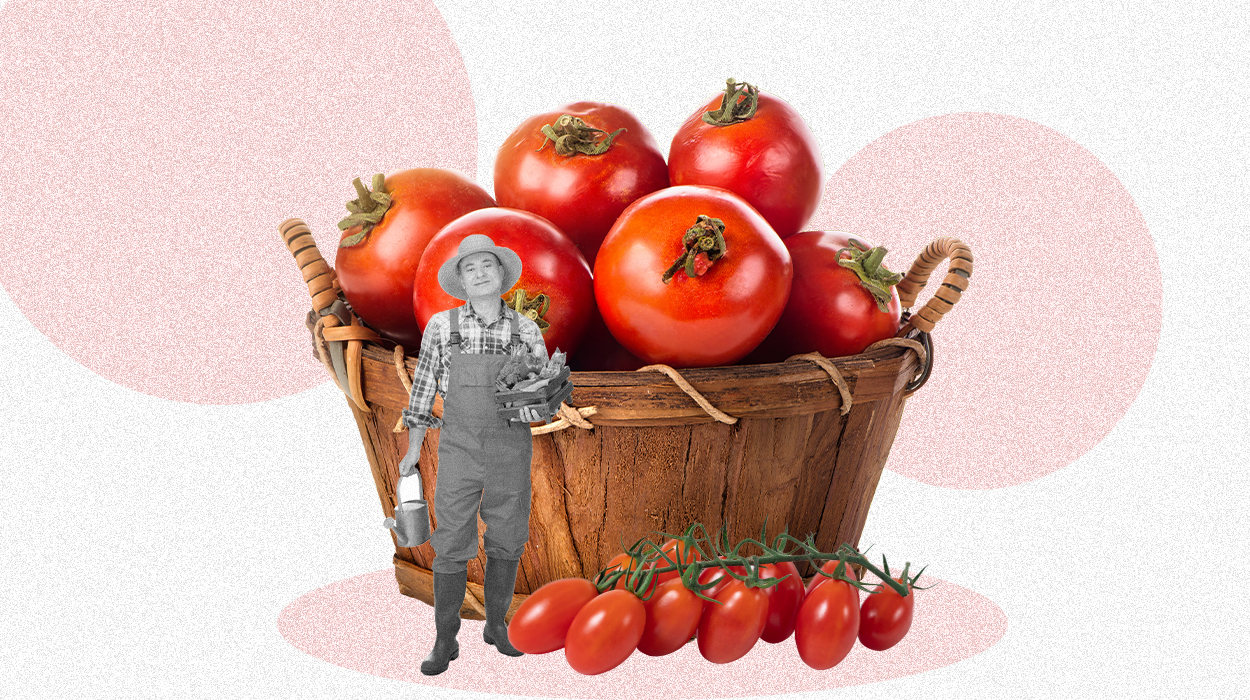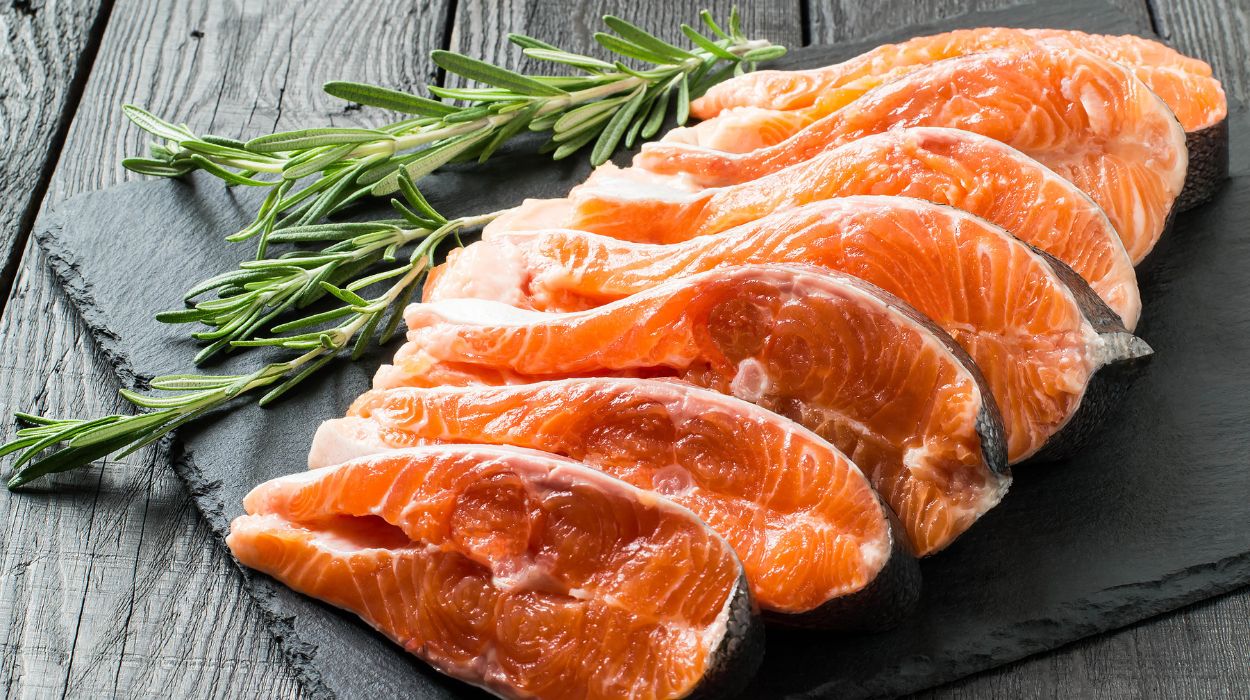Do Tomatoes Cause Inflammation? The Answer May Surprise You In 2024

Tomatoes are a staple in many cuisines and are known for their delicious taste and numerous health benefits. However, you may have heard some rumors about tomatoes causing inflammation, particularly because they are one of the nightshade vegetables. Nightshade veggies include tomatoes, bell peppers, potatoes, and eggplants containing alkaloid solanine. Do tomatoes cause inflammation, or is it just another food-related misconception?
Tomatoes and other nightshades do not cause inflammation. But, they may increase inflammation already there if too much solanine is ingested. And solanine decreases as tomatoes mature, so consuming too much of this alkaloid from ripe tomatoes is unlikely; green tomatoes contain a higher amount of solanine.
However, tomatoes are rich in lycopene, a powerful antioxidant that can help reduce inflammation[1] and provide other health benefits connected to oxidative stress. Other benefits of tomatoes include their vitamin C content, another nutrient known for its anti-inflammatory properties.[2]
We’ll explore the science behind these claims to help you understand the truth about tomatoes and inflammation. We’ll also discuss the potential health benefits and cautions when incorporating tomatoes into your diet.
Do Tomatoes Cause Inflammation?
No, tomatoes are not bad for inflammation — they are good for it! They are rich in antioxidants that help reduce inflammation and provide a range of other benefits.
Common Causes Of Inflammation
Inflammation is your body’s natural response to injury or infection. It can be triggered by various factors, one being diet. Certain foods are known to promote inflammation, while others help to reduce it. Are tomatoes one of these inflammatory foods?
Contrary to popular belief, tomatoes do not cause inflammation. Research has shown that tomato juice can help reduce systemic inflammation. It has been found to ease[3] arthritis symptoms, an inflammatory condition. However, some people may have a sensitivity or allergy to these vegetables, in which case they could experience inflammation due to consuming them.
When fighting chronic inflammation, it’s better to incorporate anti-inflammatory foods into your diet. These include green leafy vegetables, berries, fatty fish, and nuts. At the same time, try to limit the consumption of pro-inflammatory foods like fried foods, sodas, refined carbohydrates, and red meat.
Is There A Link Between Tomatoes And Inflammation?

Tomatoes are part of the nightshade family, including white potatoes and eggplants. These plants contain a toxin called solanine, a plant compound that can cause digestive issues[4] and nausea when consumed in vast amounts. However, solanine poisoning is incredibly rare and typically occurs from eating young, green potatoes rather than tomatoes.
But are tomatoes bad for arthritis? This is another common misconception, but the data on tomato products confirming this is minimal.
Both red and cherry tomatoes have similar nutritional profiles, and neither has been found to cause inflammation. On the contrary, tomatoes are known for their high levels of antioxidants, vitamins, and minerals,[5] which can support overall health and reduce inflammatory conditions, such as arthritis symptoms.
It is possible that tomatoes can raise uric acid levels in the body that trigger gout. So if you are a gout sufferer, you may want to consume them in moderation or track your symptoms after eating tomatoes.
Foods That Help Fight Inflammation
Did you know that certain foods, like fish oil, can help fight the inflammatory responses in your body? Incorporating these food items into a meal plan for inflammation can provide health benefits beyond just their nutritional content, such as helping ease symptoms associated with stiff joints.
Fatty Fish

One group of foods with powerful anti-inflammatory properties is fatty fish like salmon, mackerel, tuna, and sardines. These fish are rich in omega-3 fatty acids, which are known to reduce inflammation[6] in the body.
Green Leafy Vegetables
Green leafy vegetables, such as spinach, kale, and collards, also play a vital role in fighting inflammation. They’re packed with vitamins, minerals, and antioxidants that help your body fend off harmful inflammation.[7] Be sure to add a generous serving of these veggies whenever possible.
Nuts

Nuts like almonds, walnuts, and seeds are another excellent addition to an anti-inflammatory diet. Studies have found that consuming nuts and seeds is associated with reduced markers of inflammation[8] and a lower risk of cardiovascular disease and diabetes.
Antioxidant-rich Fruits
Remember the importance of including antioxidant-rich fruits[9] on your list. Berries such as strawberries, blueberries, cherries, and oranges are packed with antioxidants that can help protect your body from the painful ravages of inflammation.
Certain Beverages
Finally, beverages like green tea, coffee, and cocoa also have their place in an anti-inflammatory diet. The polyphenols in green tea and coffee and the flavonols in cocoa are believed to possess anti-inflammatory properties.[10]
These are different types of plant compounds with various health benefits related to helping those struggling with inflammatory conditions and the pain often associated with them.
By incorporating these nutritious and delicious foods into your daily meals, you’ll be on the right track to following an anti-inflammatory diet for optimal health.
If you can not include them in your meals, there are options for plant-based dietary supplements and greens superfood supplements. And, as always, consult your doctor or registered dietitian before making any major dietary changes.
Foods To Avoid

Inflammation can contribute to various health issues, so you must be mindful of your foods. Here are a few foods that you should avoid to reduce inflammation in your body:
- Processed foods: Ultra-processed foods high in added sugars, saturated fats, and trans fats, such as cookies, chips, and other junk foods, can trigger inflammation.[11] Replace these snacks with healthier, whole-food options like fresh fruits and nuts as much as possible.
- Fried foods: Deep-fried dishes like french fries, fried chicken, and doughnuts can also lead to inflammation. The high heat and unhealthy fats[11] used in frying can contribute to inflammatory markers in the body. Opt for baking, roasting, or steaming to prepare your food healthily.
- Red meat: High consumption of red meat,[12] mainly processed varieties like sausages and hot dogs, can increase inflammation. Aim to eat more plant-based protein sources, such as beans, lentils, and tofu. If you do eat red meat, choose lean cuts like chicken breast, turkey, and pork tenderloin and consume them in moderation.
- Sugary drinks: Beverages like soda,[13] energy drinks, and sweetened iced tea may promote inflammation due to their high sugar content. Swap these out for water, herbal teas, or unsweetened beverages.
- High-solanine foods: If you are sensitive to solanine, try swapping white potatoes for sweet potatoes that do not contain this alkaloid and avoid green tomatoes. If you must eat white potatoes, cut off the skin to rid yourself of 70% of the solanine.
By avoiding these inflammation-causing foods, you’ll take an essential step towards a balanced diet and healthier lifestyle.
Keys To Reduce Inflammation In The Body
Reducing inflammation in your body can positively impact your overall health. Here are some key steps to take to decrease inflammation:
- Load up on anti-inflammatory foods: Your food choices are crucial in protecting against inflammation. Include fresh vegetables, fruits, whole grains, and healthy fats in your diet. Some excellent anti-inflammatory options are green leafy vegetables, such as spinach, kale, and collards, as well as fatty fish like salmon, mackerel, and sardines.
- Balance your gut health: Feeding your microbiome the right nutrients can directly affect inflammation levels.[14] Consuming fiber-rich foods, such as unsweetened oatmeal topped with fruit, can be an anti-inflammatory way to start your day.
- Incorporate healthy fats: Opt for fats like olive oil, avocados, and nuts, such as almonds and walnuts. These healthy fats can help reduce inflammation,[15] making them a smart choice for your daily meals.
- Stay hydrated: Drinking plenty of water throughout the day can help flush toxins from your body and keep your inflammation levels[16] in check. Aim to drink at least 8 cups of water daily.
- Exercise regularly: Engaging in regular physical activity can help to lower inflammation.[17] Most days of the week, aim for at least 30 minutes of moderate exercise, such as brisk walking, cycling, or swimming.
- Manage stress: Chronic stress can increase inflammation[18] levels. Take time for self-care, such as practicing mindfulness, engaging in deep breathing exercises, or participating in activities you enjoy.
As you can see, several factors contribute to reducing inflammation. You can effectively decrease inflammation and improve your overall health by making small, consistent changes in your daily routines and habits.
The Bottom Line
Eating tomatoes does not cause inflammation; it help reduce it. They are a rich source of the antioxidant lycopene, which is vital in balancing inflammation in your body to promote overall health.
However, paying attention to your body and how it reacts to different foods is essential. If you notice any adverse reactions after consuming tomatoes, such as joint pain or digestion issues, consider discussing this with your healthcare provider, as you may be sensitive to the alkaloid solanine in nightshade vegetables.
+ 18 sources
Health Canal avoids using tertiary references. We have strict sourcing guidelines and rely on peer-reviewed studies, academic researches from medical associations and institutions. To ensure the accuracy of articles in Health Canal, you can read more about the editorial process here
- Ghavipour, M., Saedisomeolia, A., Mahmoud Djalali, Giti Sotoudeh, Mohammad Reza Eshraghyan, Ali Jabari Moghadam and Wood, L. (2012). Tomato juice consumption reduces systemic inflammation in overweight and obese females. [online] 109(11), pp.2031–2035. doi:https://doi.org/10.1017/s0007114512004278.
- Ellulu, M.S., Asmah Rahmat, Ismail Patimah, Huzwah Khaza’ai and Abed, Y. (2015). Effect of vitamin C on inflammation and metabolic markers in hypertensive and/or diabetic obese adults: a randomized controlled trial. [online] pp.3405–3405. doi:https://doi.org/10.2147/dddt.s83144.
- Yoshikawa, Y., Katayanagi, Y., Kamiya, M., Yamamoto, Y., Fukutomi, R., Imai, S., Miyoshi, N. and Ohashi, N. (2018). Tomato saponin supplementation ameliorates the development of experimental arthritis by regulating inflammatory responses. [online] 49, pp.458–464. doi:https://doi.org/10.1016/j.jff.2018.09.009.
- Dalvi RR;Bowie WC (2023). Toxicology of solanine: an overview. Veterinary and human toxicology, [online] 25(1). Available at: https://pubmed.ncbi.nlm.nih.gov/6338654/#:~:text=Solanine%20is%20a%20toxic%20glycoalkaloid,in%20humans%20and%20farm%20animals.
- Ali, Y., Ibn, A., Shahad Saif Khandker, Lutfun Neesa, Tanvir, E.M., Kabir, A., Khalil, I. and Siew Hua Gan (2020). Nutritional Composition and Bioactive Compounds in Tomatoes and Their Impact on Human Health and Disease: A Review. [online] 10(1), pp.45–45. doi:https://doi.org/10.3390/foods10010045.
- Costabile, G., Giuseppe Della Pepa, Vetrani, C., Colla, G., Griffo, E., Giacco, R., Vitale, M., Salamone, D., Rivellese, A.A., Annuzzi, G. and Lutgarda Bozzetto (2021). An Oily Fish Diet Improves Subclinical Inflammation in People at High Cardiovascular Risk: A Randomized Controlled Study. [online] 26(11), pp.3369–3369. doi:https://doi.org/10.3390/molecules26113369.
- K.D.P.P. Gunathilake, K. K. D. S. Ranaweera and H.P. Vasantha Rupasinghe (2018). In Vitro Anti-Inflammatory Properties of Selected Green Leafy Vegetables. [online] 6(4), pp.107–107. doi:https://doi.org/10.3390/biomedicines6040107.
- Zhi Gen Yu, Malik, V.S., Keum, N., Hu, F.B., Giovannucci, E., Stampfer, M.J., Willett, W.C., Fuchs, C.S. and Bao, Y. (2016). Associations between nut consumption and inflammatory biomarkers,. [online] 104(3), pp.722–728. doi:https://doi.org/10.3945/ajcn.116.134205.
- Majdan, M. and Bobrowska-Korczak, B. (2022). Active Compounds in Fruits and Inflammation in the Body. [online] 14(12), pp.2496–2496. doi:https://doi.org/10.3390/nu14122496.
- Hussain, T., Tan, B., Yin, Y., François Blachier, Carine, M. and Najma Rahu (2016). Oxidative Stress and Inflammation: What Polyphenols Can Do for Us? [online] 2016, pp.1–9. doi:https://doi.org/10.1155/2016/7432797.
- Teng, K.-T., Chang, C.-Y., Chang, L. and Kalanithi Nesaretnam (2014). Modulation of obesity-induced inflammation by dietary fats: mechanisms and clinical evidence. [online] 13(1). doi:https://doi.org/10.1186/1475-2891-13-12.
- Wang, Y., Uffelman, C., Hill, E., Anderson, N.D., Reed, J.S., Olson, M.T. and Campbell, W.W. (2022). The Effects of Red Meat Intake on Inflammation Biomarkers in Humans: A Systematic Review and Meta-Analysis of Randomized Controlled Trials. [online] 6, pp.994–994. doi:https://doi.org/10.1093/cdn/nzac068.023.
- Hu, Y., Costenbader, K.H., Gao, X., Al-Daabil, M., Sparks, J.A., Solomon, D.H., Hu, F.B., Karlson, E.W. and Lu, B. (2014). Sugar-sweetened soda consumption and risk of developing rheumatoid arthritis in women , , ,. [online] 100(3), pp.959–967. doi:https://doi.org/10.3945/ajcn.114.086918.
- Zahraa Al Bander, Marloes Dekker Nitert, Barbora de Courten and Negar Naderpoor (2020). The Gut Microbiota and Inflammation: An Overview. [online] 17(20), pp.7618–7618. doi:https://doi.org/10.3390/ijerph17207618.
- Fritsche, K.L. (2015). The Science of Fatty Acids and Inflammation. [online] 6(3), pp.293S301S. doi:https://doi.org/10.3945/an.114.006940.
- Azuma, K., Mori, T., Kawamoto, K., Kuroda, K., Takeshi Tsuka, Tomohiro Imagawa, Osaki, T., Itoh, F., Minami, S. and Okamoto, Y. (2014). Anti-inflammatory effects of ozonated water in an experimental mouse model. [online] 2(5), pp.671–674. doi:https://doi.org/10.3892/br.2014.290.
- Scheffer, L. and Latini, A. (2020). Exercise-induced immune system response: Anti-inflammatory status on peripheral and central organs. [online] 1866(10), pp.165823–165823. doi:https://doi.org/10.1016/j.bbadis.2020.165823.
- Viktoriya Maydych (2019). The Interplay Between Stress, Inflammation, and Emotional Attention: Relevance for Depression. [online] 13. doi:https://doi.org/10.3389/fnins.2019.00384.



